-
REVIEW05-03-2024
Elements of fatherhood involved in the gestational period: a scoping review
Revista Brasileira de Enfermagem. 2024;77(1):e20230029
Abstract
REVIEWElements of fatherhood involved in the gestational period: a scoping review
Revista Brasileira de Enfermagem. 2024;77(1):e20230029
DOI 10.1590/0034-7167-2023-0029
Views0See moreABSTRACT
Objective:
To identify in the literature and summarize the elements and characteristics of fatherhood involved during pregnancy.
Method:
Scoping review that used PRISMA-ScR guide to report this review. Searches were carried out in PubMed, CINAHL, PsycInfo, LILACS and Scopus. Google search engines and public health agency websites assisted in searches of gray literature and Rayyan in screening studies.
Results:
A total of 406 articles were identified, of which 16 made up the final sample. Five elements make up an involved fatherhood: feeling like a father, being a provider and protector, being a partner and participant in pregnancy, participating in prenatal appointments and feeling prepared to take care of a baby.
Conclusion:
Fathers want to be involved in prenatal care, but feel excluded from this process. Public policies that encourage paternal involvement and healthcare professional training to better welcome and promote paternal involvement are of paramount importance.
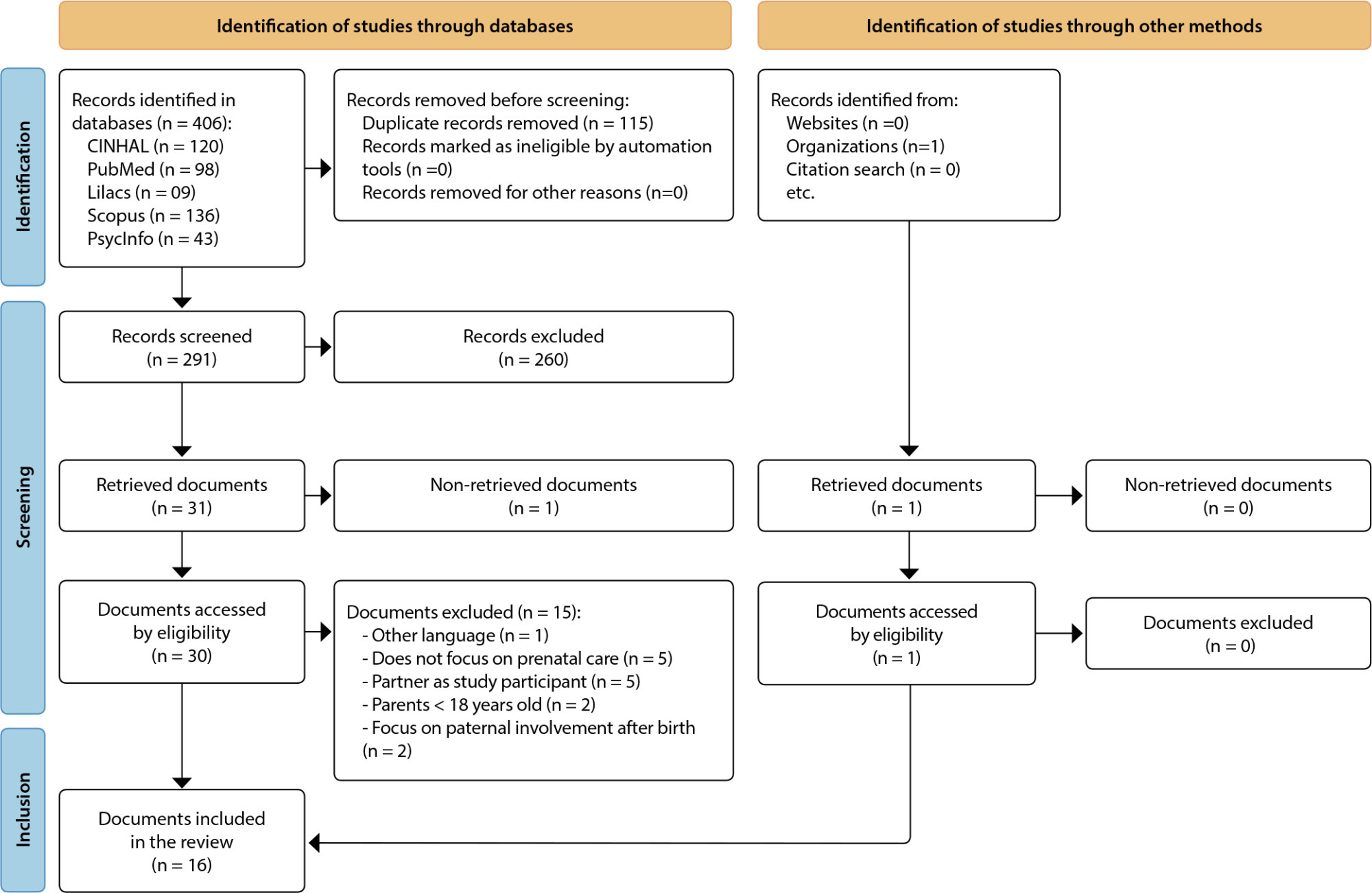
-
ORIGINAL ARTICLE05-03-2024
Josicélia Dumêt Fernandes’ professional trajectory: contributions to psychiatric and mental health nursing
Revista Brasileira de Enfermagem. 2024;77(1):e20230174
Abstract
ORIGINAL ARTICLEJosicélia Dumêt Fernandes’ professional trajectory: contributions to psychiatric and mental health nursing
Revista Brasileira de Enfermagem. 2024;77(1):e20230174
DOI 10.1590/0034-7167-2023-0174
Views0See moreABSTRACT
Objectives:
to analyze nurse Josicélia Dumêt Fernandes’ life story, with emphasis on her work in the psychiatry and mental health fields.
Methods:
historical, qualitative research. Semi-structured interviews and documentary research were used as data collection techniques, collected from September to October 2021. For data analysis, we opted for the content analysis method and comparison with the Foucauldian philosophical framework.
Results:
four categories emerged: Transforming herself and mental health practices; (Re)framing professional practice; Nursing practice and power relations; and The paths and implications in the psychiatry and mental health fields.
Final Considerations:
the study of the biographer demonstrates a search for transformation of herself and mental health practices, with a rupture in paradigms and reframing of her practice in psychiatry and mental health.
-
ORIGINAL ARTICLE05-03-2024
Psychometric properties of the Chilean version of the quality of life questionnaire for multiple myeloma
Revista Brasileira de Enfermagem. 2024;77(1):e20230100
Abstract
ORIGINAL ARTICLEPsychometric properties of the Chilean version of the quality of life questionnaire for multiple myeloma
Revista Brasileira de Enfermagem. 2024;77(1):e20230100
DOI 10.1590/0034-7167-2023-0100
Views0See moreABSTRACT
Objectives:
To evaluate the internal consistency and construct validity of the QLQ-MY20 for assessing the quality of life in multiple myeloma survivors in Chile.
Methods:
This was a cross-sectional study conducted between March 2020 and December 2022. It involved 118 individuals from two public hospitals. The QLQ-C30 and QLQ-MY20 questionnaires were used. Internal consistency was assessed using Cronbach’s alpha(α), and construct validity was evaluated through hypothesis testing (Mann-Whitney and Spearman correlation).
Results:
The average age of participants was 67.2 years (SD=9.2). Internal consistency for the complete scale was α=0.779, for the “disease symptoms” dimension α=0.671, for the “side effects of treatments” dimension α=0.538, and for the “future perspective” dimension α=0.670. Four of the five construct validity hypotheses were confirmed: women, individuals with worse performance status, those with pain, and those with worse fatigue showed more symptoms.
Conclusions:
The Chilean version of the QLQ-MY20 demonstrates adequate internal consistency and construct validity.
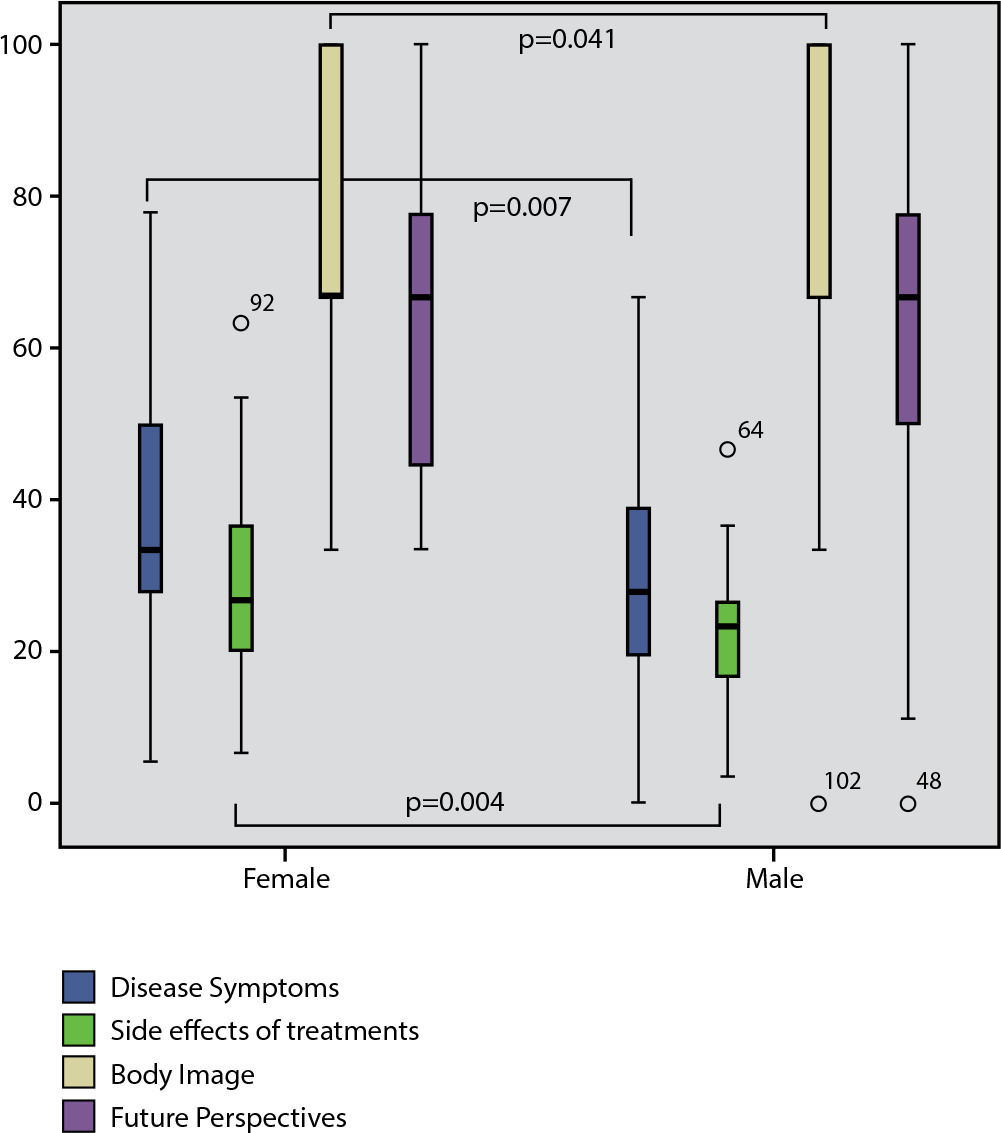
-
ORIGINAL ARTICLE05-03-2024
Pregnancy loss in women with systemic lupus erythematosus: Grounded Theory
Revista Brasileira de Enfermagem. 2024;77(1):e20230225
Abstract
ORIGINAL ARTICLEPregnancy loss in women with systemic lupus erythematosus: Grounded Theory
Revista Brasileira de Enfermagem. 2024;77(1):e20230225
DOI 10.1590/0034-7167-2023-0225
Views0See moreABSTRACT
Objective:
to learn the meanings attributed to pregnancy loss by women with Lupus.
Method:
qualitative research, based on Symbolic Interactionism and Grounded Theory. Data collection took place between January and August 2022 through in-depth interviews. Data analysis went through the stages of initial and focused coding.
Results:
seventeen women participated. The central phenomenon “The climb to motherhood: falls and overcoming” was constructed, consisting of three categories: “Falling to the ground during the climb: the experience of pregnancy loss”; “Getting up and following the path: new attempts to conceive”; and “Remembering the journey: meanings attributed to pregnancy losses”.
Final considerations:
experiencing pregnancy is, analogously, like climbing a mountain, where obstacles need to be overcome to reach the summit. The experience of pregnancy loss is seen as complex, especially when there is fragility in healthcare and a lack of awareness regarding feelings of loss and grief.
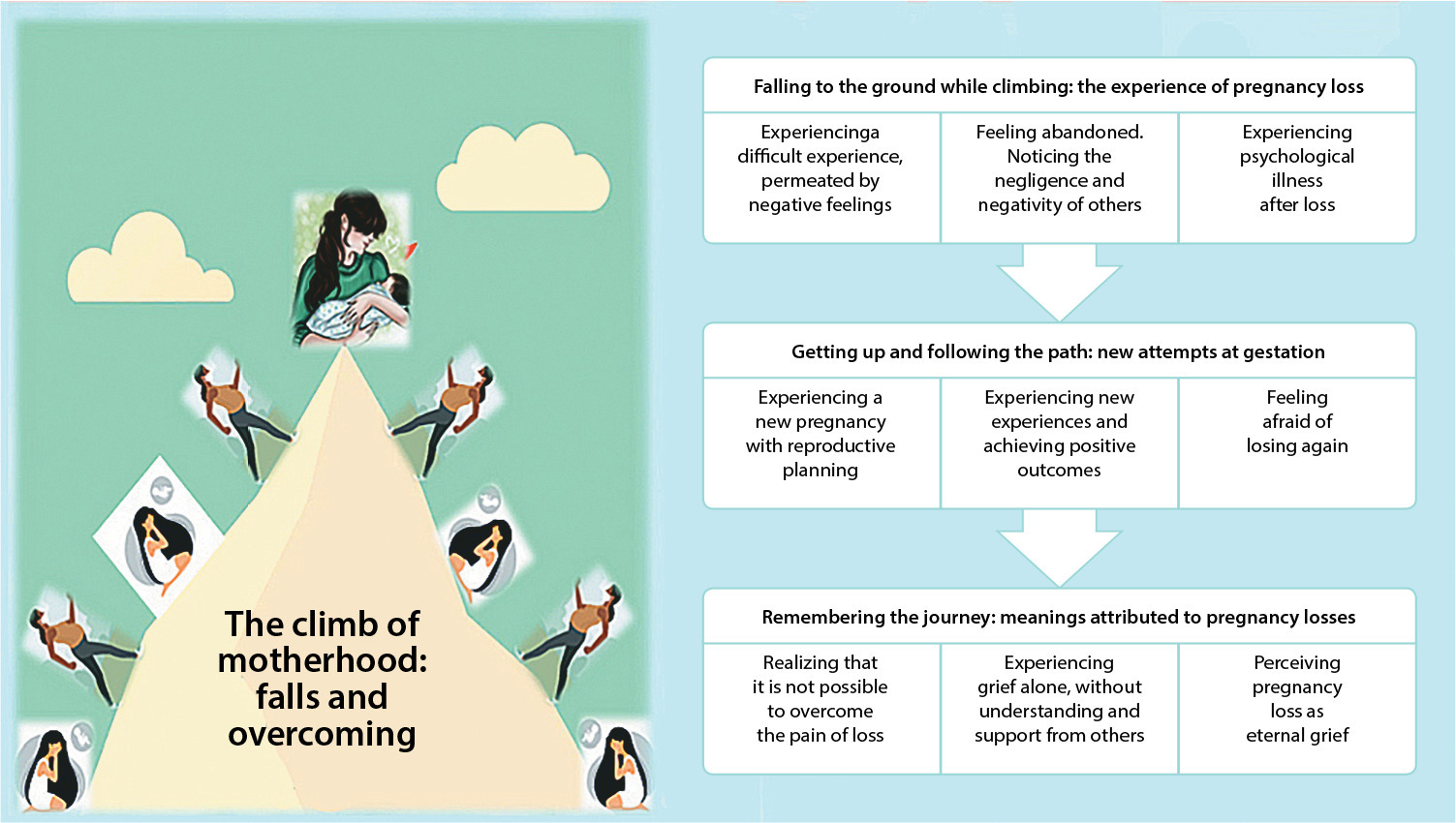
-
05-03-2024
Preditores de volume excessivo de líquidos em pacientes em hemodiálise: estudo observacional
Revista Brasileira de Enfermagem. 2024;77(1):e20220816
Abstract
Preditores de volume excessivo de líquidos em pacientes em hemodiálise: estudo observacional
Revista Brasileira de Enfermagem. 2024;77(1):e20220816
DOI 10.1590/0034-7167-2022-0816
Views0See moreRESUMEN
Objetivos:
evaluar los factores de riesgo del exceso de volumen de líquido en pacientes en hemodiálisis.
Métodos:
estudio retrospectivo de casos y controles. Se incluyeron 392 pacientes (196 casos y 196 controles) de dos centros de hemodiálisis. Se evaluaron datos sociodemográficos y 23 factores de riesgo de exceso de volumen de líquido mediante un formulario de recolección de datos. Los datos se analizaron mediante un modelo de regresión logística multivariado.
Resultados:
factores de riesgo conocimiento insuficiente (OR=2,06), ingesta excesiva de líquidos (OR=2,33), retirada inadecuada de líquidos durante la hemodiálisis (OR=2,62) e ingesta excesiva de sodio (OR=1,91) pueden aumentar aproximadamente dos veces la posibilidad de que se produzca un exceso de volumen de líquido en pacientes en hemodiálisis. La educación (OR=0,95) y la edad (OR=0,97) son factores protectores del volumen excesivo de líquido.
Conclusiones:
conocer estos factores de riesgo puede ayudar a las enfermeras a realizar una inferencia diagnóstica precisa y rápida del riesgo de volumen excesivo de líquidos.
-
REVIEW05-03-2024
Nursing interventions to empower the family caregiver of person with lower limb amputation: scoping review
Revista Brasileira de Enfermagem. 2024;77(1):e20230264
Abstract
REVIEWNursing interventions to empower the family caregiver of person with lower limb amputation: scoping review
Revista Brasileira de Enfermagem. 2024;77(1):e20230264
DOI 10.1590/0034-7167-2023-0264
Views0See moreABSTRACT
Objectives:
to map nursing interventions that empower the Family caregiver of the person with lower limb amputation for is role.
Methods:
scoping review guided by Joanna Briggs Institute methodology conducted in different databases (including gray literature).
Results:
six studies published between 2009 and 2021 were included. Interventions of counselling and support for patients and family; peer support interventions performed by a certified pair; involvement of caregivers or family members in support groups; and key interventions for patient and family caregiver psychological balance. Two studies discussed the importance of caregiver and amputee training and development of coping skills. Another study recommended Interventions of informative support for caregivers regarding care for the amputee and adaptation to home.
Conclusions:
results of this review allow the identification of recommendations (guidelines) for practice and recommendations/suggestions for interventions according with identified needs of family caregivers of patients with lower limb amputation.
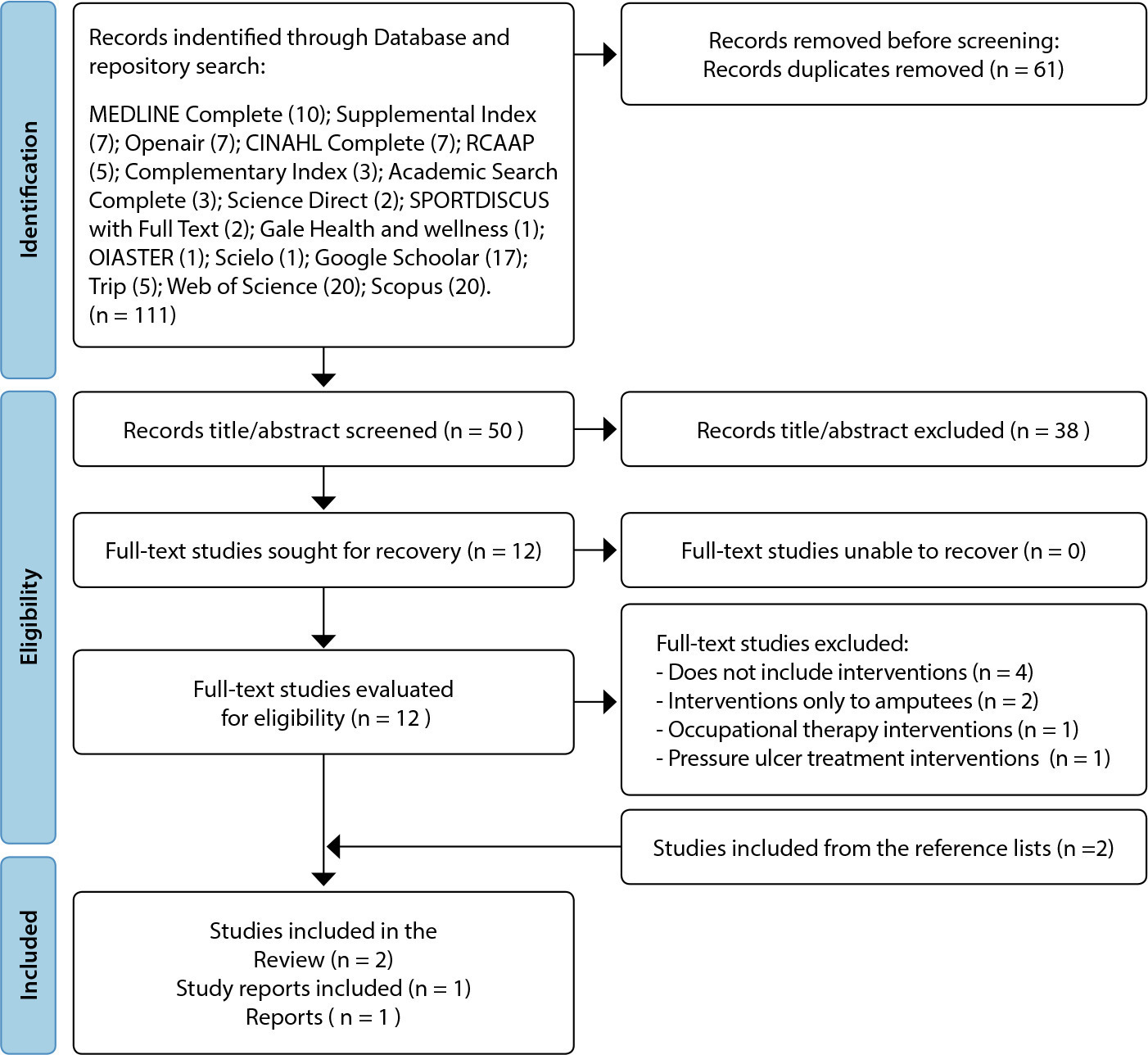
-
05-03-2024
Intervenções de Enfermagem para capacitar o cuidador familiar de uma pessoa com amputação de membro inferior: revisão de escopo
Revista Brasileira de Enfermagem. 2024;77(1):e20230264
Abstract
Intervenções de Enfermagem para capacitar o cuidador familiar de uma pessoa com amputação de membro inferior: revisão de escopo
Revista Brasileira de Enfermagem. 2024;77(1):e20230264
DOI 10.1590/0034-7167-2023-0264
Views0See moreRESUMEN
Objetivos:
mapear intervenciones de enfermería que capaciten al cuidador familiar de la persona con amputación de miembro inferior para su rol.
Métodos:
es una revisión de alcance guiada por la metodología del Instituto Joanna Briggs, llevada a cabo en diferentes bases de datos (incluyendo literatura gris).
Resultados:
se tuvieron en cuenta seis estudios publicados entre 2009 y 2021, a saber: intervenciones de asesoramiento y apoyo para pacientes y familiares; intervenciones de apoyo entre iguales realizadas por un par de profesionales certificados; participación de cuidadores o familiares en grupos de apoyo e intervenciones clave para el equilibrio psicológico del paciente y del cuidador familiar. Dos estudios analizaron la importancia de la formación del cuidador y del amputado y del desarrollo de habilidades de afrontamiento. Otro estudio recomendó intervenciones de apoyo informativo para los cuidadores en relación con el cuidado del amputado y su adaptación a la vida hogareña.
Conclusiones:
los resultados de esta revisión permiten identificar recomendaciones/directrices para la práctica y recomendaciones/sugerencias de intervenciones según las necesidades identificadas de los cuidadores familiares de pacientes con amputación de miembros inferiores.
-
05-03-2024
Propiedades psicométricas de la versión chilena del cuestionario de calidad de vida para mieloma múltiple
Revista Brasileira de Enfermagem. 2024;77(1):e20230100
Abstract
Propiedades psicométricas de la versión chilena del cuestionario de calidad de vida para mieloma múltiple
Revista Brasileira de Enfermagem. 2024;77(1):e20230100
DOI 10.1590/0034-7167-2023-0100es
Views0See moreRESUMEN
Objetivos:
Evaluar consistencia interna y validez de constructo del QLQ-MY20 para valoración de calidad de vida en sobrevivientes de mieloma múltiple en Chile.
Métodos:
Estudio transversal, realizado entre marzo 2020 y diciembre 2022. Participaron 118 personas de dos hospitales públicos. Se utilizaron los cuestionarios QLQ-C30 y QLQ-MY20. Fueron evaluadas la consistencia interna con alfa de Cronbach (α) y validez de constructo mediante pruebas de hipótesis (Mann Whitney y correlación de Spearman).
Resultados:
El promedio de edad de los participantes era 67,2 (DE=9,2) años. Consistencia interna para escala completa (α=0,779), dimensión “síntomas de la enfermedad” (α=0,671), dimensión “efectos secundarios de los tratamientos” (α=0,538) y dimensión “perspectiva de futuro” (α=0,670). Se comprobaron cuatro de las cinco hipótesis de la validez de constructo: presentaron más síntomas las mujeres, personas con peor performance estatus, con dolor y con peor fatiga.
Conclusiones:
La versión chilena del QLQ-MY20 presenta adecuada consistencia interna y validez de constructo.
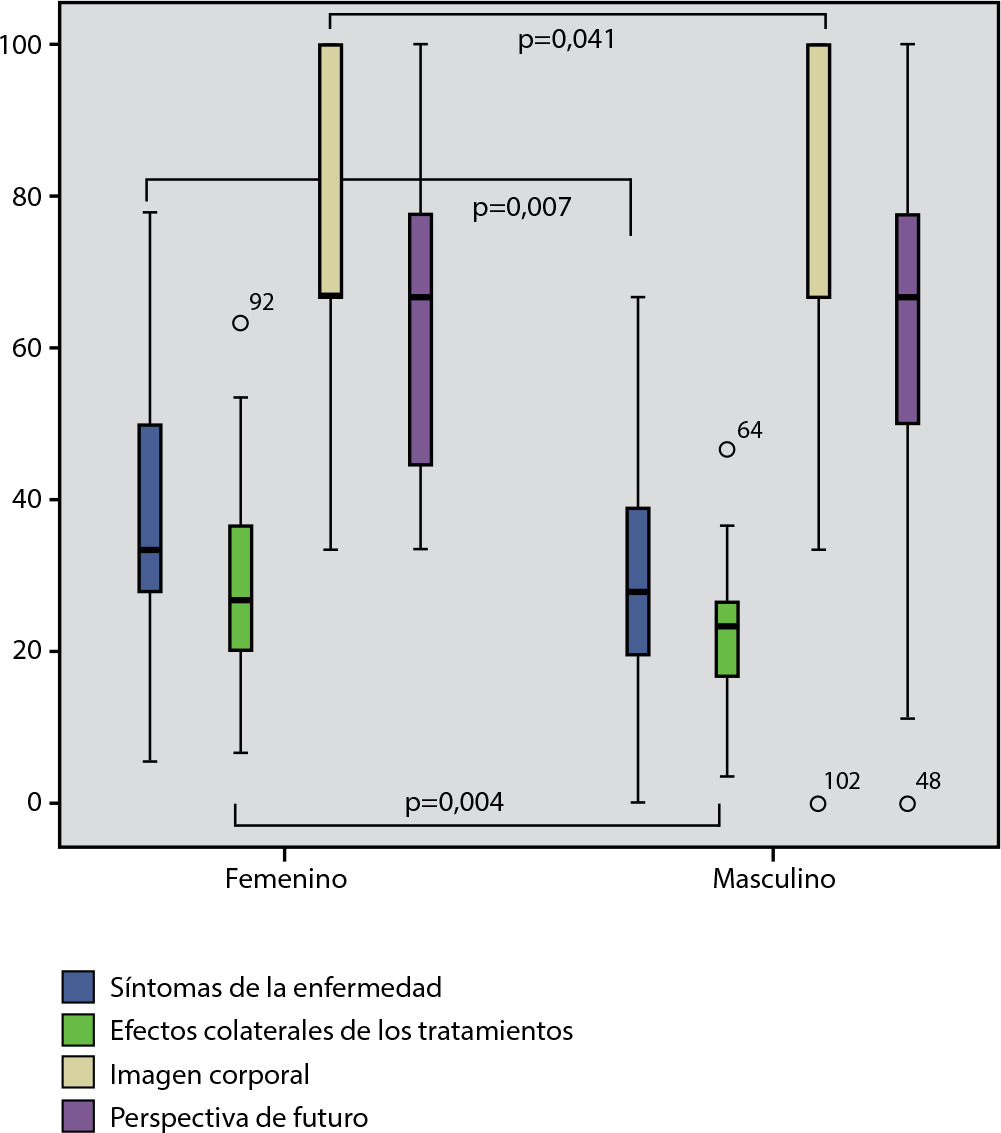
-
ORIGINAL ARTICLE07-31-2020
Pain assessment in pediatrics
Revista Brasileira de Enfermagem. 2020;73:e20190109
Abstract
ORIGINAL ARTICLEPain assessment in pediatrics
Revista Brasileira de Enfermagem. 2020;73:e20190109
DOI 10.1590/0034-7167-2019-0109
Views0See moreABSTRACT
Objectives:
to investigate how the pain assessment and management process in pediatric patients is performed and suggestions for its improvement.
Methods:
exploratory, qualitative study. Nine professionals from the nursing team of a pediatric hospital unit in Porto Alegre/RS participated in the study. A sociodemographic questionnaire and semi-structured interviews were used with content analysis.
Results:
the results reinforced the importance of pain assessment with family participation and the need to use tools and process improvements in the training and sensitization of professionals.
Final Considerations:
after the study was concluded, there was a clear need to address the issue, highlighting its relevance for pain resolution in pediatric patients.
-
03-19-2021
Validity and reliability of Kessler Psychological Distress Scale for Brazilian elderly: a cross-sectional study
Revista Brasileira de Enfermagem. 2021;74:e20200365
Abstract
Validity and reliability of Kessler Psychological Distress Scale for Brazilian elderly: a cross-sectional study
Revista Brasileira de Enfermagem. 2021;74:e20200365
DOI 10.1590/0034-7167-2020-0365
Views0See moreABSTRACT
Objective:
to verify the validity and reliability of the Psychological Distress Scale for screening mental distress.
Methods:
a cross-sectional study with 75 elderly people. Psychological Distress scale and Self Reporting Questionnaire were used. Criterion validity was verified using Spearman’s correlation and diagnostic accuracy measures. Cronbach’s alpha coefficient was used to investigate reliability.
Results:
the total internal consistency of the Psychological Distress Scale was α=0.844. Concurrent validity between this instrument and the Self Reporting Questionnaire was ρ=0.722 (p<0.001). The best cut-off point for screening mental distress among elderly people was a total score greater than 14, with sensitivity equal to 75.47% and specificity equal to 85.0%.
Conclusions:
the scale was robust for screening mental distress, given its high reliability, in terms of homogeneity, and adequate criterion validity, whose best cut-off point for screening was a score greater than 14.
-
ORIGINAL ARTICLE10-21-2019
Hand hygiene: knowledge and skill of caregivers in the hematopoietic stem cell transplantation
Revista Brasileira de Enfermagem. 2019;72(6):1653-1662
Abstract
ORIGINAL ARTICLEHand hygiene: knowledge and skill of caregivers in the hematopoietic stem cell transplantation
Revista Brasileira de Enfermagem. 2019;72(6):1653-1662
DOI 10.1590/0034-7167-2018-0788
Views0See moreABSTRACT
Objective:
to identify the knowledge and ability of caregivers on hand hygiene in hematopoietic stem cell transplantation.
Method:
a prospective cross-sectional study. A questionnaire was used to identify the knowledge and it was observed the hygiene technique performance. Data were collected in two units (autologous and allogeneic transplant).
Results:
the 37 participants recognized the importance of hand hygiene and 95.5% related to removal of dirt or infection prevention. 91.9% stated that it was important to clean their hands with soap and water when entering and leaving the room, and 64.9% understood that it was necessary to apply alcoholic solution after washing. On average, the caregivers scored 6.16 steps, when demonstrating the washing technique and 3.91 steps in the friction with alcoholic solution.
Conclusion:
although they recognize the importance of the procedure, there are deficits related to the moment and the correct way of doing it, evidencing the need for strategies aimed at improving this process.
-
EXPERIENCE REPORT07-31-2020
(In)visibility of children with special health needs and their families in primary care
Revista Brasileira de Enfermagem. 2020;73:e20190071
Abstract
EXPERIENCE REPORT(In)visibility of children with special health needs and their families in primary care
Revista Brasileira de Enfermagem. 2020;73:e20190071
DOI 10.1590/0034-7167-2019-0071
Views0See moreABSTRACT
Objectives:
to discuss the (in)visibility of children with special healthcare needs and their families in the Primary Health Care scenario.
Methods:
experience report about the difficulties faced by researchers from different regions of Brazil to locate children with special healthcare needs in the scope of primary care.
Results:
the main reason for these children and their families to be “unknown” and, therefore, not assisted in PHC, is the fact that they are followed-up by institutions/outpatient clinics and specialized and/or public rehabilitation clinics, or even because they have private health insurance.
Final Considerations:
transferring care responsibility to the Primary Health Care teams to specialized and rehabilitation institutions may be related to the lack of knowledge of the care demands of this group, as well as to the relevance of care centered on rehabilitation and the specialty instead of the long-term care, one of the features of primary health care.
-
ORIGINAL ARTICLE10-21-2019
Perception of health professionals about neonatal palliative care
Revista Brasileira de Enfermagem. 2019;72(6):1707-1714
Abstract
ORIGINAL ARTICLEPerception of health professionals about neonatal palliative care
Revista Brasileira de Enfermagem. 2019;72(6):1707-1714
DOI 10.1590/0034-7167-2018-0842
Views0See moreABSTRACT
Objective:
To identify the perception of health professionals about neonatal palliative care.
Method:
A phenomenological qualitative study, a non-probabilistic sample, of 15 health professionals from a neonatal intensive care unit in northern Portugal. Content analysis was performed.
Results:
Despite their lack of training in palliative care, the health professionals showed concern for the dignity, quality of life and comfort of the newborn and family. They expressed emotional and relational difficulties in following the trajectories of serious illness and death and in the ethical decisions regarding the end-of-life.
Conclusion:
It is emphasized that professionals are sensitive to pain and suffering and reveal dedicated and committed in the care of the newborn and family. They are available to train and embrace the current challenges posed by the constitution of pediatric palliative care teams and to help achieve an organizational culture that advances in such care.
-
ORIGINAL ARTICLE06-27-2019
Nursing diagnoses in a home-based program: cross-mapping and NANDA-I Taxonomy
Revista Brasileira de Enfermagem. 2019;72(3):584-591
Abstract
ORIGINAL ARTICLENursing diagnoses in a home-based program: cross-mapping and NANDA-I Taxonomy
Revista Brasileira de Enfermagem. 2019;72(3):584-591
DOI 10.1590/0034-7167-2018-0323
Views0See moreABSTRACT
Objective:
to identify Nursing diagnoses in patients in home care by cross-mapping terms obtained in the anamnesis and clinical examination, with NANDA-I Taxonomy.
Method:
descriptive exploratory study, transversal type, performed with 131 patients from a home health care program in northern Minas Gerais State. With the aid of an instrument based on the theoretical model of Basic Human Needs, the terms indicators of conditions that required nursing interventions were extracted. The cross-mapping of these terms was also performed with NANDA-I Taxonomy diagnoses.
Results:
378 terms and expressions referring to 49 different diagnoses were identified in 11 of the 13 domains of NANDA-I Taxonomy.
Conclusion:
the profile of identified nursing diagnoses can contribute to care management and organizational processes of nurses who provide care to patients in home care.
-
07-05-2021
Educational technology for bathing/hygiene of elders at home: contributions to career knowledge
Revista Brasileira de Enfermagem. 2021;74:e20200890
Abstract
Educational technology for bathing/hygiene of elders at home: contributions to career knowledge
Revista Brasileira de Enfermagem. 2021;74:e20200890
DOI 10.1590/0034-7167-2020-0890
Views0See moreABSTRACT
Objective:
to build and validate an educational booklet for bathing and hygiene of elders at home.
Methods:
a methodological study, developed through data collection in literature and situational diagnosis, booklet construction, material qualification through validation by expert judges (11 nurses) and target audience (30 caregivers). Data were analyzed descriptively. The minimum content validity index of 0.80 was considered.
Results:
in content and appearance validation, experts assigned Content Validity Index global of 0.92, while for assessment of the material’s suitability, the booklet was classified as “superior”, with an average of 90%. In the validation of caregivers, the overall Content Validity Index was 1.0.
Conclusion:
the booklet was successfully validated and can be considered in the context of health education and collaborate with an adequate and safe practice of bathing and hygiene of elders at home.
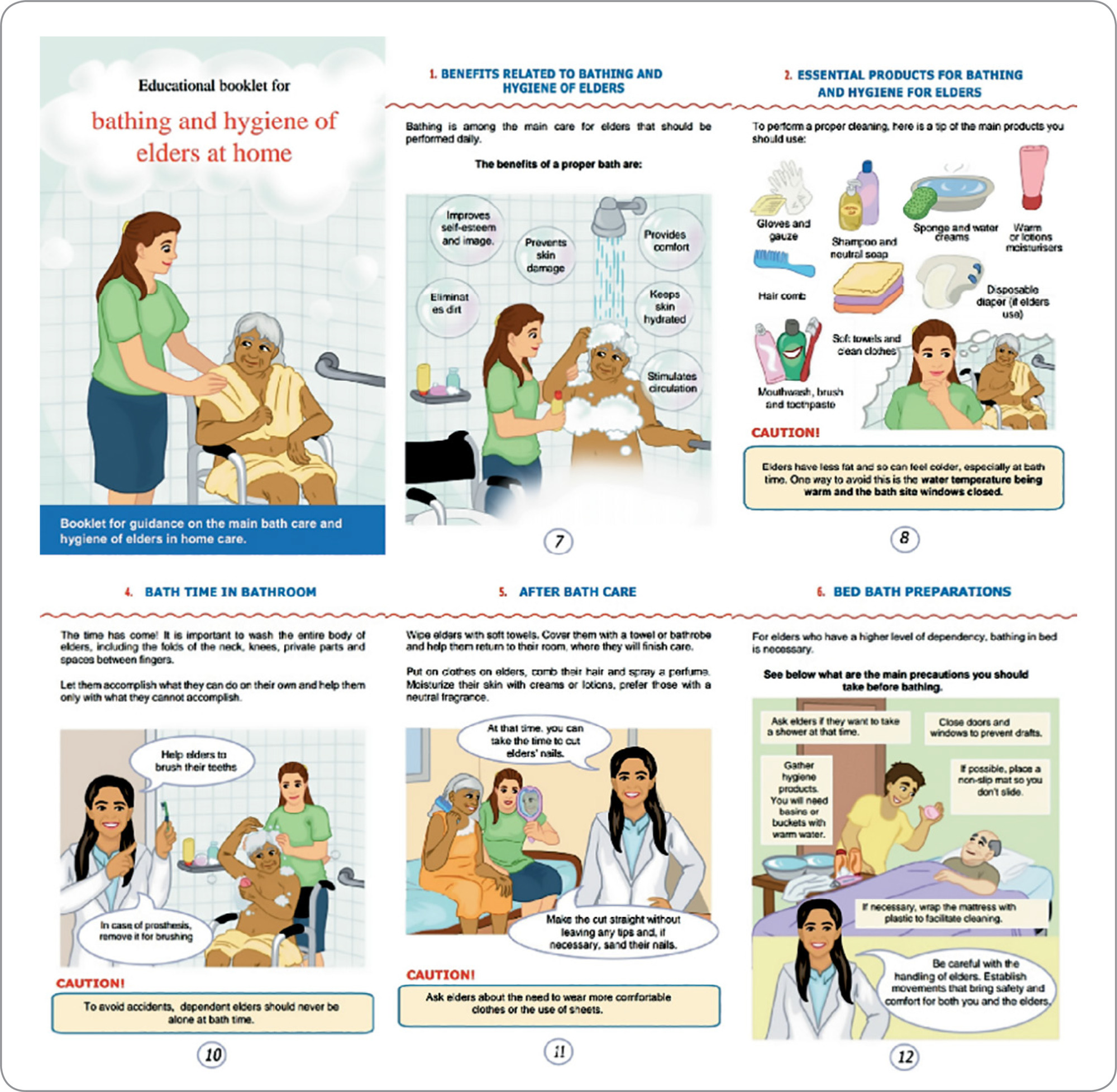
-
ORIGINAL ARTICLE12-05-2019
Quality of life, burden, family emotional support: a model for older adults who are caregivers
Revista Brasileira de Enfermagem. 2019;72:169-176
Abstract
ORIGINAL ARTICLEQuality of life, burden, family emotional support: a model for older adults who are caregivers
Revista Brasileira de Enfermagem. 2019;72:169-176
DOI 10.1590/0034-7167-2018-0439
Views0See moreABSTRACT
Objective:
To investigate associations between quality of life, sex, age, burden, and nature of emotional support available in the family in older adults who are caregivers of older relatives.
Method:
Cross-sectional and correlational study on 148 caregivers gathered in public and private healthcare services, who were subjected to psychological measures of quality of life, burden, exchange of emotional support, sex, and age. Data were analyzed using Chi-square, Fisher’s exact test and path analyses (p < 0.05).
Results:
A total of 77% women, average age of 69.7 years. There were significant associations between exchange of support and burden due to the provided assistance, being a woman and satisfaction with the received support, satisfaction with the received support and burden, burden and quality of life, and satisfaction with the received support and feeling of burden due to the provided support.
Conclusion:
Satisfaction with the received emotional support moderate the association between sex and burden, and such moderate the association between satisfaction with emotional support and perceived quality of life.
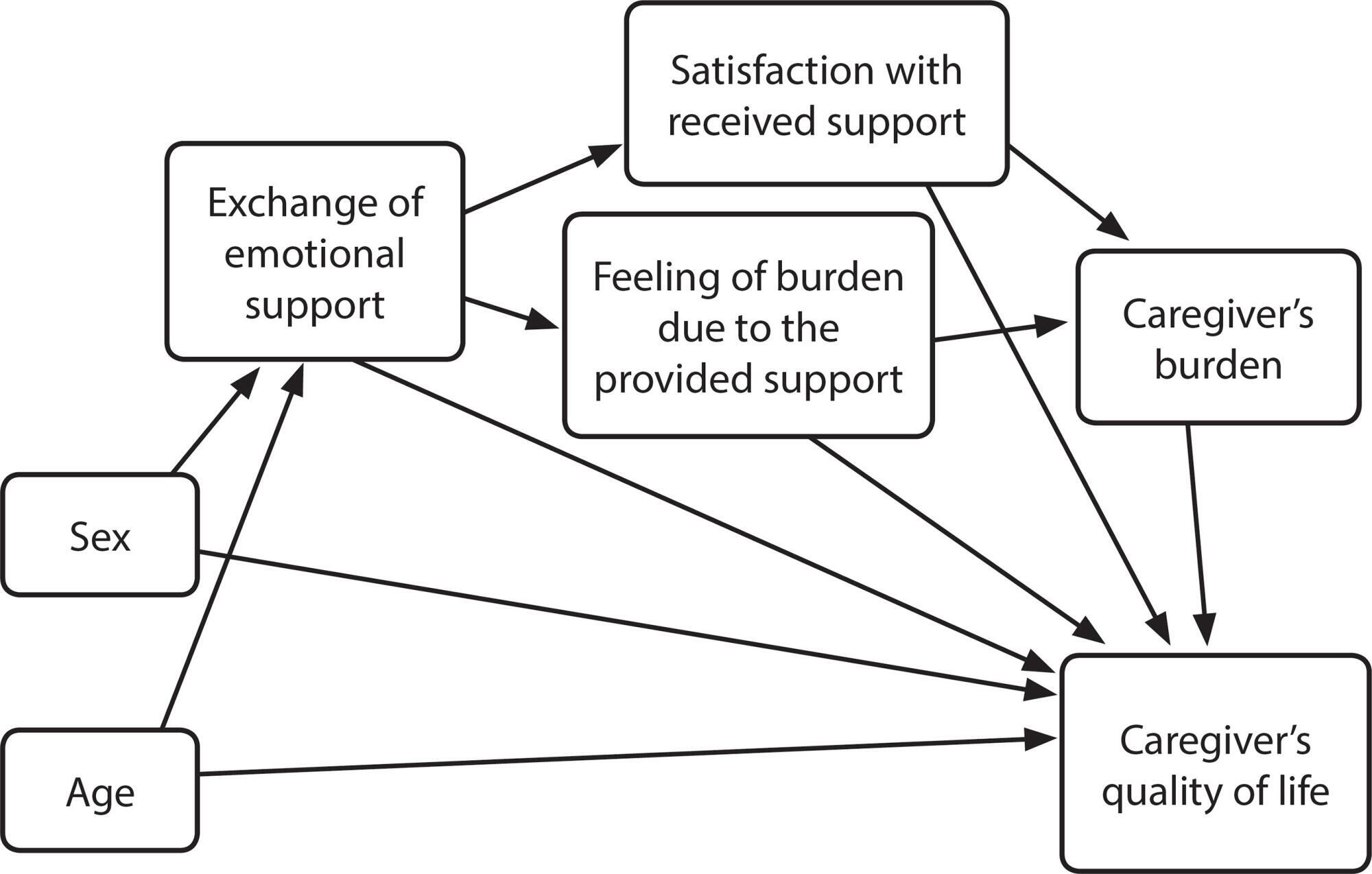
Search
Search in:
Nuvem de Tags
Adolescente (85) Atenção Primária à Saúde (239) COVID-19 (91) Criança (91) Cuidados de Enfermagem (269) Educação em Enfermagem (151) Educação em Saúde (139) Enfermagem (930) Enfermagem Pediátrica (86) Estudantes de Enfermagem (77) Estudos de Validação (131) Família (87) Idoso (208) Promoção da Saúde (99) Qualidade de Vida (104) Saúde do Trabalhador (86) Saúde Mental (145) Saúde Pública (82) Segurança do Paciente (150) Tecnologia Educacional (100)



